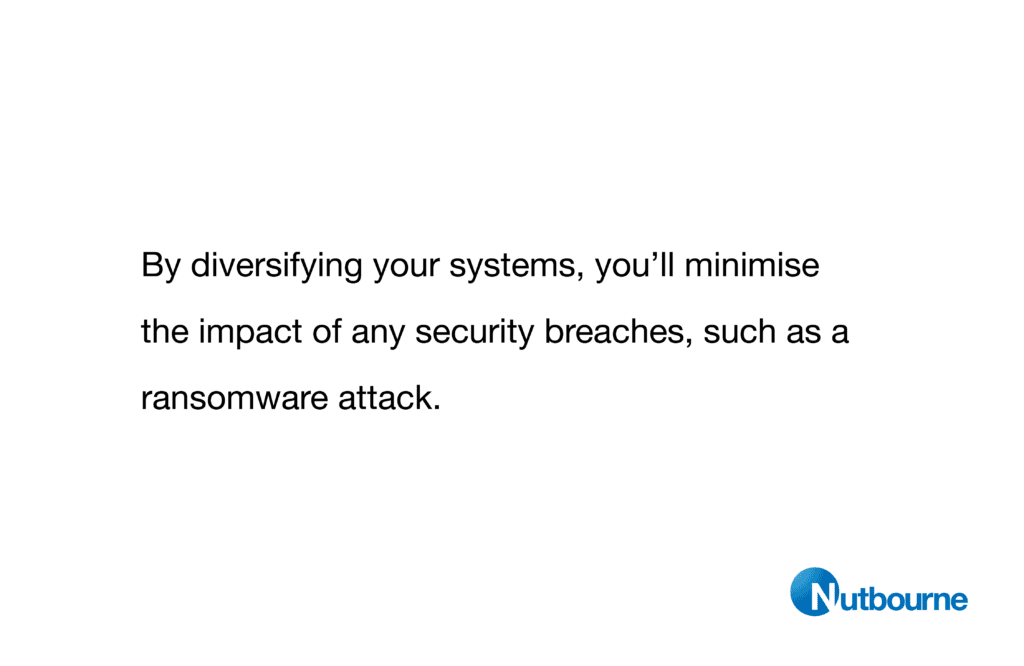Cloud computing is rapidly growing as it proliferates through the business world – and it’s not hard to see why. What were solely hosted servers, originally, has now evolved into a huge number of individual services. These can be consumed on a minute-by-minute basis, paying only for what you need. Its ability to connect and combine with other services and to meet an infinite number of uses makes it a very flexible option; especially when compared with the classic on premise options.
We’re starting to see a greater number of organisations discovering the power of mixing and matching cloud services, creating solutions that address different business needs. This has given rise to new and distinct branches of cloud computing. Multi-cloud or hybrid-cloud approaches, for example, offer greater variety, flexibility and business performance.
To find out how these can benefit your business, we spoke to Patrick Burgess and Marcus Evans, Technical Director and Managing Director, respectively, of IT company, Nutbourne. Nutbourne offers comprehensive cloud services in London, for their take on all things cloud…
Mix And Match To Suit Business Need
“The key considerations here are resilience and flexibility,” says Marcus. “What do you need to do to keep your company running in event of an office closure? How can you facilitate flexible working?”
More companies are moving to hybrid models to de-risk their operations and to help their workforce migrate to flexible working patterns. There has been a notable shift away from traditional licensing models for infrastructure-software packages that applied to a single version of the product.
“Those older models are both costly and prohibitive,” Marcus adds. “The version-based model limits the functionality and means people can fall behind quickly when newer versions come out. These models encouraged boom and bust, with companies upgrading versions of software in big, impactful and expensive jumps.
“What we’re seeing now is the implementation of more fluid and cost-effective approaches. The cloud-based software packages are constantly updated and receive the latest features. Users are also able to work across multiple machines in multiple locations.
“It means that you can scale systems according to business need. Without incurring unnecessary cost, ensuring that you don’t fall behind. It gives you both redundancy and greater functionality, which is why many people are moving to this sort of hybrid environment.”
Marcus adds that building a suite of products to suit business requirements is easier than ever. This is because of the way in which products are developing. Putting together an eco-system of software that’s both agile and scalable is helping businesses to prosper and to expand (or contract) as is necessary.
“Most of these products talk to each other, so it’s easy to mix and match. A lot of people go down the Google route, but still more are opting to go down the Microsoft route. The joy of hybrid cloud services in London is that you can largely mix and match, if a client requires you to do that.
“It provides that flexibility which is why it can be so beneficial for modern businesses. You don’t have to buy bespoke or clumsy bits of software which get out of date.”

Cloud Is A Resource
Physical on premise servers are costly. Traditionally, companies have spent a lot of their infrastructure capital expenditure on in-house servers. They work well for 3-5 years, or so, after which they become unreliable, reach capacity or stop working. This leaves the company with an expensive bill required to replace them.
“What tends to happen in that scenario is that the company doesn’t have the money to replace the servers,” says Patrick. “Very few companies will have been putting budget aside each year for a new server, and the cost can be a big shock.
“This is where cloud is very useful. Rather than buying a new server, you can pay to store your information within the cloud. It comes at a fraction of the upfront cost of a server, and is scalable. Think of it as a resource at your disposal, and use it as such.”
Patrick cites the example of one organisation that Nutbourne consulted for recently. The company had a large aging physical web infrastructure in a datacentre, that were going to cost close to £100,000 to replace over three years – £70,000 of which was required up front. That’s one of the reasons that cloud services in Londonare just so appealing.
“We advised them to move their data into the cloud,” Patrick adds. “That reduced the upfront project fee down to £15,000, because all they’re doing is paying to use a service and not for kit or hardware. Not having a massive outlay of cash is very useful (especially in the current climate of uncertainty). Also if you need to grow or shrink your infrastructure dramatically later down the line then then you can do that. You can just grow it, exponentially, or shrink it down so that you’re only paying for what’s needed.”

It’s A Safe Bet For Security
Diversifying your storage can be good for business continuity. By not having all your data in one place, you can mitigate a lot of risk should you suffer a security breach, or if your files are encrypted by ransomware.
“By diversifying the systems, you’ll minimise the impact of any security breaches, such as a ransomware attack,” says Patrick. “That doesn’t make the risk go away, of course. But the likelihood of a cloud service being breached is far lower than your internal servers. But the recovery is likely to be faster if they doget breached. If you select the right provider, then you can pass a significant amount of risk to them because they will be investing in updating, optimising and securing their servers.”
Patrick adds that regular backups to the cloud from any remaining internal infrastructure further mitigates risk. “Conversely, if you go and put your stuff into cloud-based CRM applications, then you should be taking offline backups in case they become breached, themselves.
“Overall, cloud services in London can be a sure-fire win for businesses. It should form part of their overall IT strategy” Patrick concludes. “Whether it’s on-demand availability of computer systems, data storage or computing power, they provide value, agility and the ability to move the business in the right direction for a lower upfront cost.”
Contact Us
So, if you’d like to find out more about our cloud services in London, then get in touch! Contact Nutbourne today on 0203 137 7273. Or visit our LinkedIn page to get insights into what we have been up to in the IT world.
